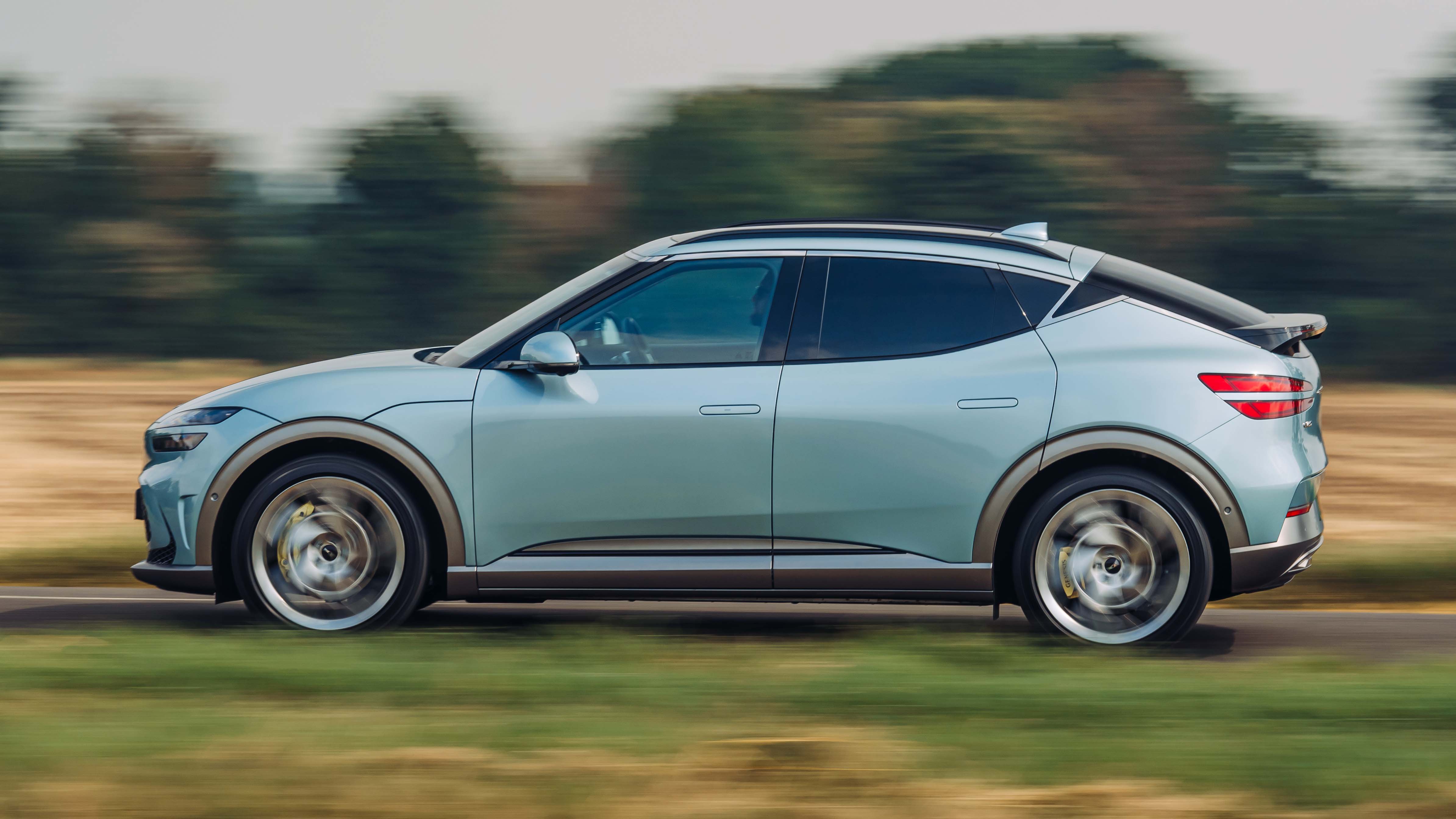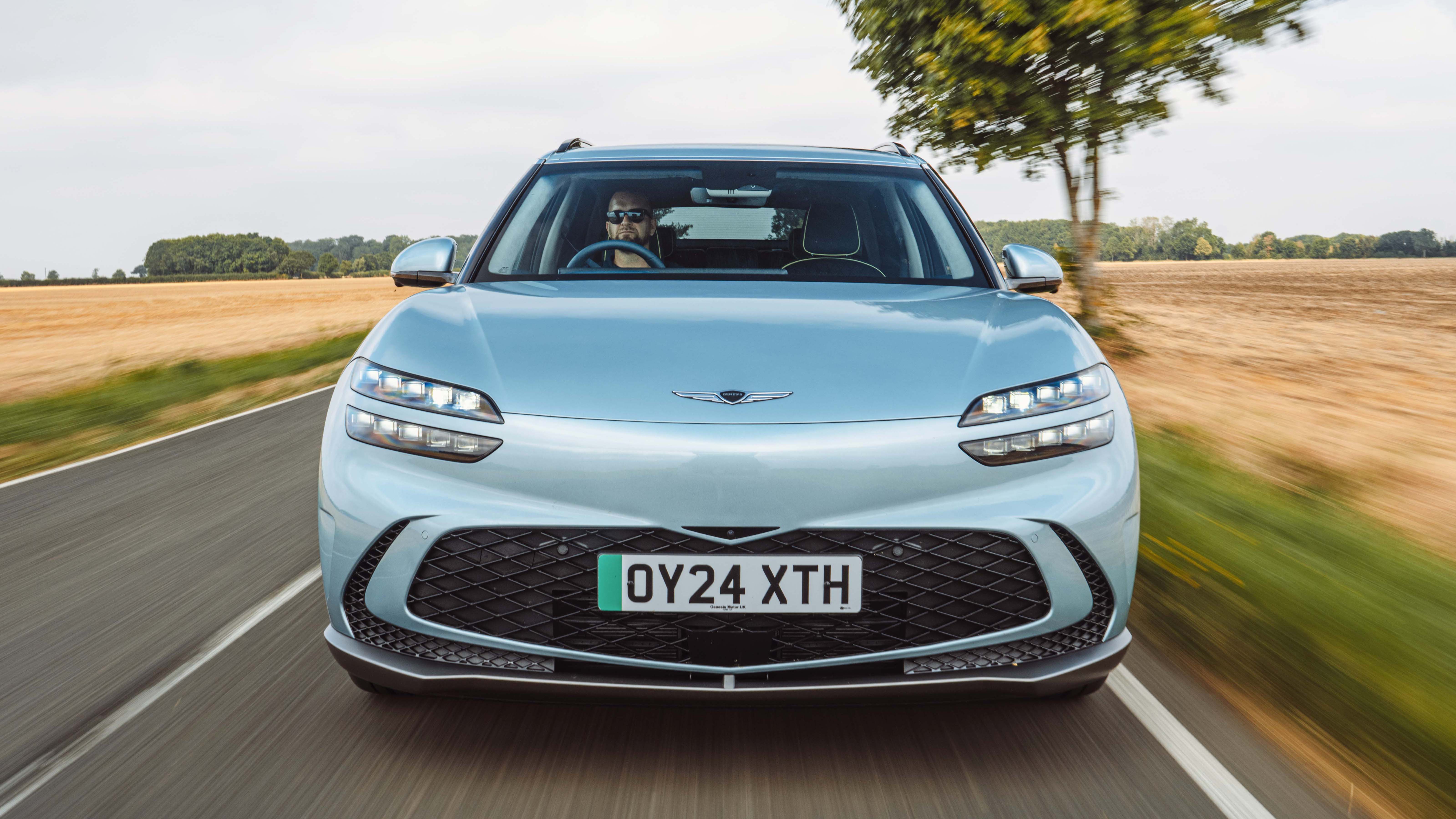
Genesis GV60 Sport Plus - long-term review
£66,900 / as tested £74,855 / PCM £985
SPEC HIGHLIGHTS
- SPEC
Genesis GV60 Sport Plus
- Range
289 miles
- ENGINE
1cc
- BHP
482.8bhp
- 0-62
4s
The Genesis GV60 Sport Plus has a secret drift mode
Never been a fan of marketing-speak, but Genesis says the GV60 is all about ‘athletic elegance’, so that seems like an opportune segue into a chat about handling and performance. Just to get things out of the way, the GV60, in this Sport Plus, dual-motor format, has plenty of raw speed. The rear-wheel drive car with the biggest range gets a single rear motor with 225-ish bhp - which is probably enough. The Sport Plus like this gets two motors, each with 241.38bhp, giving some 483bhp/516lb ft when you ask for all of it. That gives you 0-62mph in 4.1s and a 146mph top end. That’s a decent shot for a family-sized sort-of SUV thing.
Then there’s Boost Mode - accessed by a little button on the right-hand lower side of the steering wheel - that jacks everything up into full ‘roid for 10 seconds no matter what mode you happen to be in at the time. Handy for overtaking. And it really is handy, though it steps off pretty hard, so you actually have to be quite ready for it. Don’t do what I did and belt it whenever the passenger is just about to take a sip of a takeaway beverage, because the results are not pretty. Sorry Mrs.F.
This is all very interesting, but not that groundbreaking for an EV. Mainly because the GV60 is still a heavy thing. At 2,145kg there’s a lot of mass to move, and a good chunk of that is battery. Which I decided to work out using maths. The weight of a lithium-ion car battery per kilowatt-hour (kWh) is around 4kg. That’s an energy density of about 200–300 Wh/kg, according to science. So you’re looking at the GV60 having 77.4kWh of energy in there (with a useable capacity of 74.0kWh thanks to cell-saving buffers), meaning 77.4 x 4 to give a rough estimate of 309.6kg of battery to deal with. Weight is fine for a four-wheel drive car with plenty of torque, but it’s the sworn enemy of explicit handling.
Now the GV60 is on the Hyundai/Kia/Genesis e-GMP shared platform, which means that mass is positioned between the axles, low in the centre of the platform, making for a low centre of gravity. Very much the usual EV ‘skateboard’ style platform. That’ll help with stability, if not precision.
Then there’s strut-type front suspension with aluminium lower arms, and five-link rear suspension with an integrated drive axle – a single structure that serves as the driveshaft and wheel bearing – that shunts power from the motor to the wheels. The ‘integrated’ bit is apparently important, because melding the two together gives you a ten per cent lighter component that’s also over 40 per cent stiffer. Oh, and the car automatically disconnects the front axle from the drive system when just cruising, adding to efficiency. Slap the accelerator to the floor, or choose one of the sportier modes, and it’s always all-wheel drive.
So what does it all add up to? Bluntly, a car that’s very fast but steady. There’s surprising grip, always etched with the feeling of weight. It’ll rear up and pull across the diagonal if you floor it mid-corner - which makes it sometimes feel a little soft - and eventually you’ll get understeer. It’s all very manageable and - as mentioned - surprisingly rapid, but I’d hesitate to say actual fun. This is a car set up for the 95 per cent of owners who like to squirt past traffic but really aren’t bothered about on-the-limit shenanigans. Which is absolutely spot on, really - it’s not that sort of car.
Still, there is a hooligan mode, even if it is well-buried. Because, like the Kia GT, the GV60 gets a ‘Drift Mode’, which makes it rear-wheel drive only. So, the cheat code works like this: put the car in Park and switch off the traction control (press and hold the traction button). Then whack the car in Sport mode from either the screen or the mode button on the left-hand lower side of the wheel, and pull both brake re-gen paddles for three seconds. ‘Drift Mode’ will appear in the driver’s information screen, and you’re good to go. Which is to say, you can bake some tyres.
Worth noting here that the drift mode isn’t as keen as in the Kia GT, and it feels slightly awkward - like the GV60 really isn’t that up for it and there might be some digital eye-rolling going on. But still, the GV60 really does have a naughty side, you just have to tease it out a bit.
Featured

Trending this week
- Car Review
BMW 1 Series
- Top Gear's Top 9
Nine dreadful bits of 'homeware' made by carmakers






